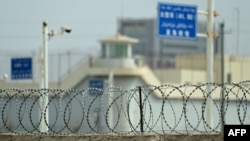Reports of overcrowded detention centers in China are spreading on the country’s social media platforms as Chinese law enforcement cracks down on both petty and serious crime.
Analysts say China’s increasing economic challenges from the slowing economy to unemployment and a massive property crisis, are all contributing to higher crime rates and in turn an increase in detainees at detention centers.
In one video posted on October 9 on the Chinese social media platform Xiaohongshu, Beijing-based lawyer Zhao Haidong describes a recent visit to the city’s Fengtai Detention Center.
“In some of the smaller rooms there are around 20 people, in bigger rooms around 30 or 40 people,” he said, adding that the number of detainees was much more than in previous years.
In another video published in August, Wang Rui, a lawyer in Sichuan, says he found 20 people detained in a 12-person room. The detainees had to sleep sideways together on a 30-foot-long bed. Wang reports that China is looking to expand its detention center infrastructure.
One Chinese human rights lawyer who asked to speak anonymously with VOA citing security concerns said he had witnessed similar circumstances.
The lawyer said he recently visited an insurance agent who was detained in Hebei province on allegations of “corruption.” Describing the conditions, the lawyer said, "There are 28 people living in a detention room of more than 10 square meters, and a dozen square meters can only accommodate about 7-9 people."
VOA reached out to all three detention centers for comment on the reports of overcrowding. The Fengtai Detention Center refused to comment and said reporters must visit the center in person and present their press credentials before its liaison office would speak with them.
The detention center in Hebei also refused to comment over the phone and the center in Sichuan did not respond to a request for information.
Detention centers are designed to hold individuals awaiting trials and those who are arrested for petty crimes serving three or fewer months of jail time. Their overcrowding has become a problem as China has increasingly arrested more people in violation of the law.
According to official statistics from the Supreme People’s Procuratorate of China, 367,000 people were approved for arrest in the first half of 2024, an increase of 18.5% over the previous year. Reports also show that China has prosecuted over 761,000 people this year, an increase of almost 7%.
On China’s social media platforms, lawyers cite two reasons for the increase: a tougher crackdown on crime and worsening economic hardships.
Shen Yanan, a lawyer in Shandong province, says actions that were previously tolerated are now being targeted for arrest.
These include illegal transactions, trade disputes, pornography, gambling, fishing and collecting protected wild herbs, reported lawyer Sun Lianwei on her social media accounts.
Many online lawyers attribute the rise in arrests to increasing economic pressures and note that financial crimes have increased because of the pressure of mortgages, car loans and work.
Lin Zhanhui, assistant professor at Feng Chia University in Taichung, said that China's expansion of the definition of national security, heightening levels of social stability maintenance and changing standards for illegal behavior are the reasons for overcrowded detention centers.
"The CCP [Chinese Communist Party] is constantly expanding its criminal crackdown, through the so-called rule of law. [In addition to] maintaining stability for economic crimes, mass protests and political issues [must] be stabilized through national security laws,” Lin told VOA.
Taiwanese democracy activist Lee Ming-che, who has firsthand experience in Chinese prisons, believes local government corruption could also be playing into the increase in arrests.
“With China’s economic stagnation, and detention centers need to survive, local governments may be detaining more people [to] raise revenues and cracking down in these crimes that used to be overlooked,” Lee said.
In China, inmates can pay to upgrade their meals and buy daily necessities. More inmates lead to more sales, increasing the revenue for the detention center and local government.
Lin Zhanhui has also observed local governments in China using “rule by law” as a means of bringing more money into local coffers. Such methods include short-term detentions and fines, he said.
Additionally, Lin agreed with the assessment of lawyers online in China that economic shifts, including rising youth unemployment, corporate layoffs, factory closures and general employment struggles were contributing to the rise in overall crime.
Given the rising costs of living in China, some people, he says, could even see arrest as a means to get free meals provided in detention centers.
Facing harder times and more stringent laws, online legal influencers say it is the responsibility of individual citizens to avoid arrest. That is a frequent reminder that lawyers give in videos posted on social media.
“And here, I want to remind everyone: before you do anything [illegal], be sure to think twice, think twice and then think twice again,” lawyer Shi Chuang says.




